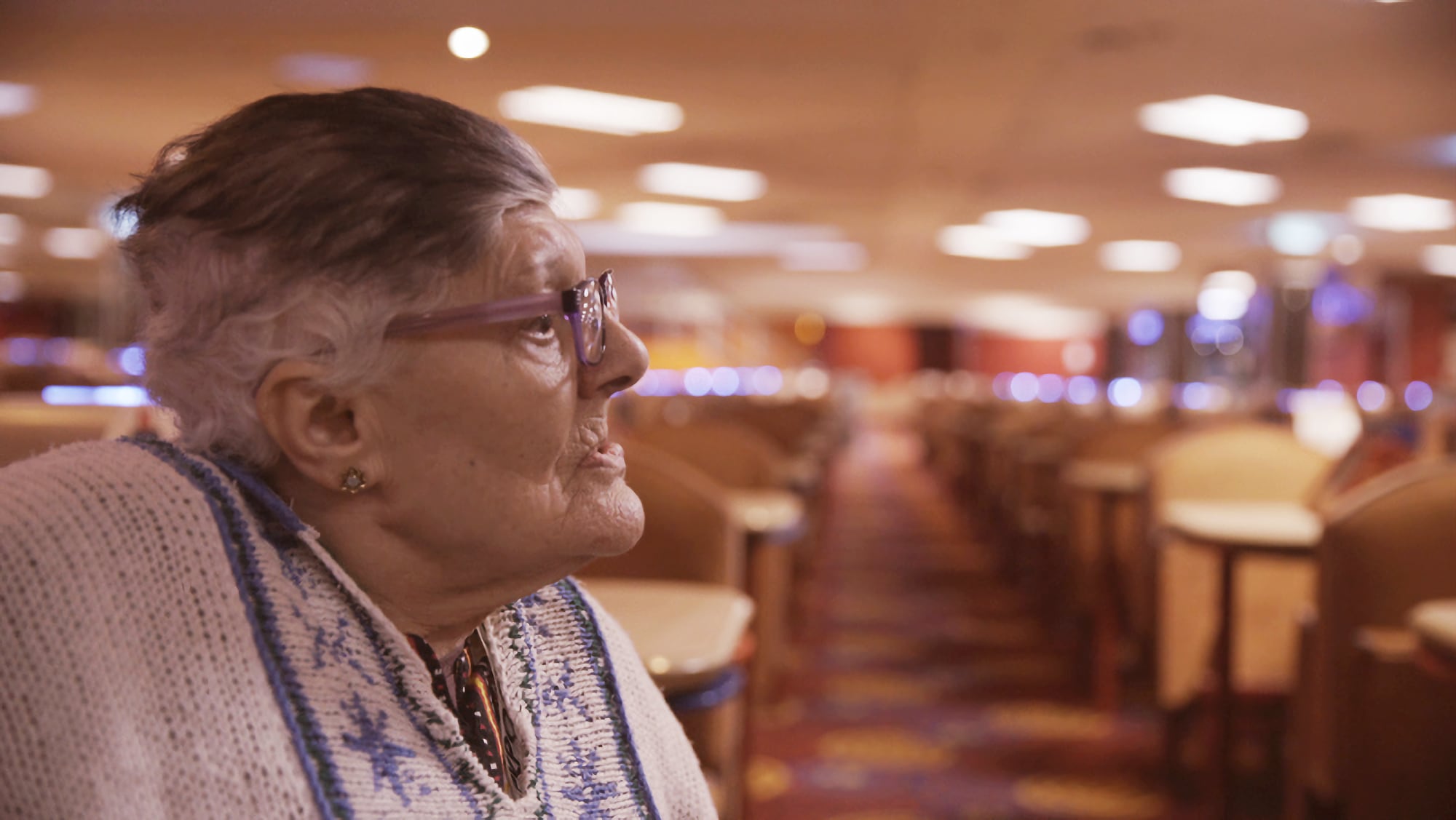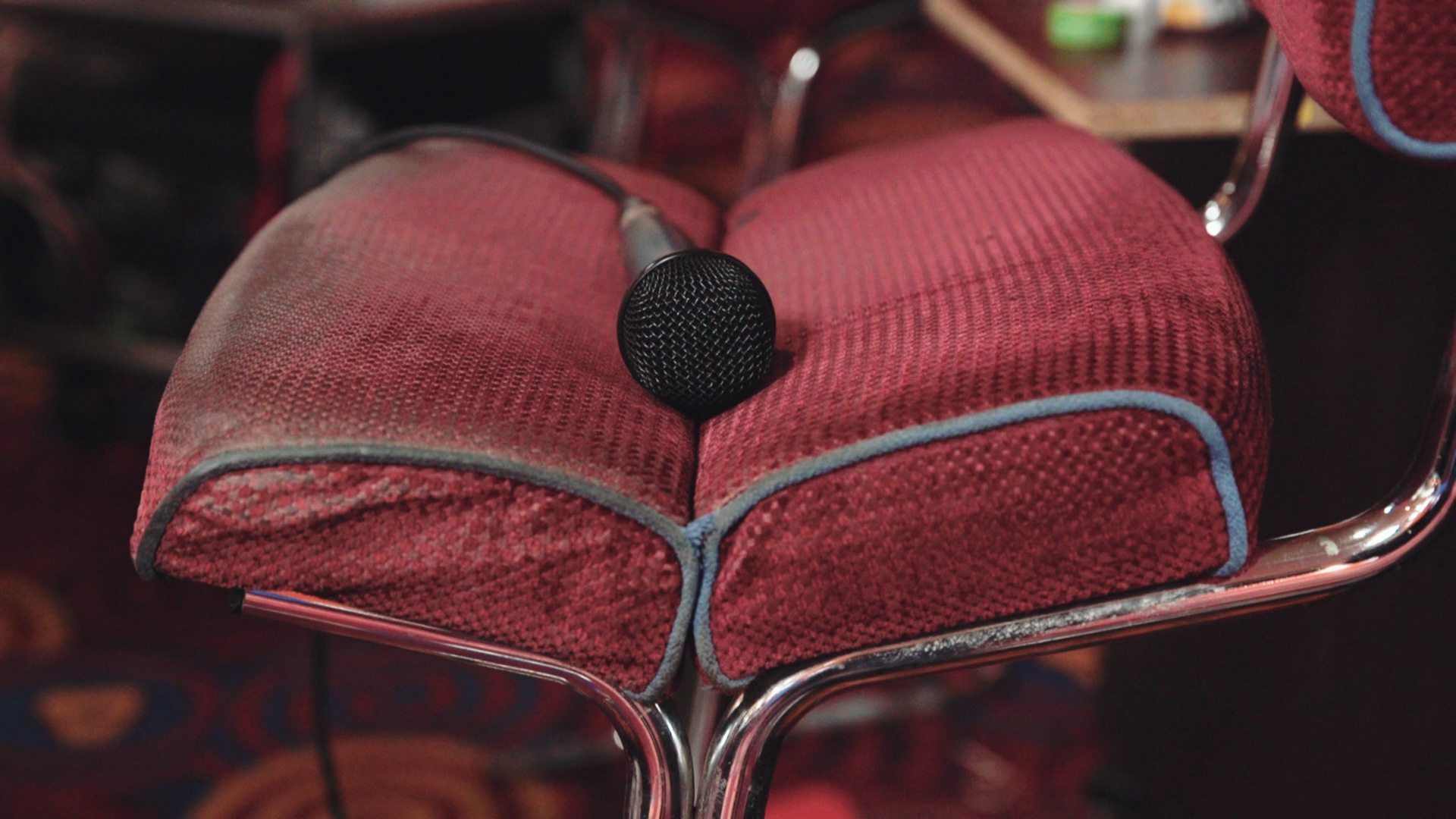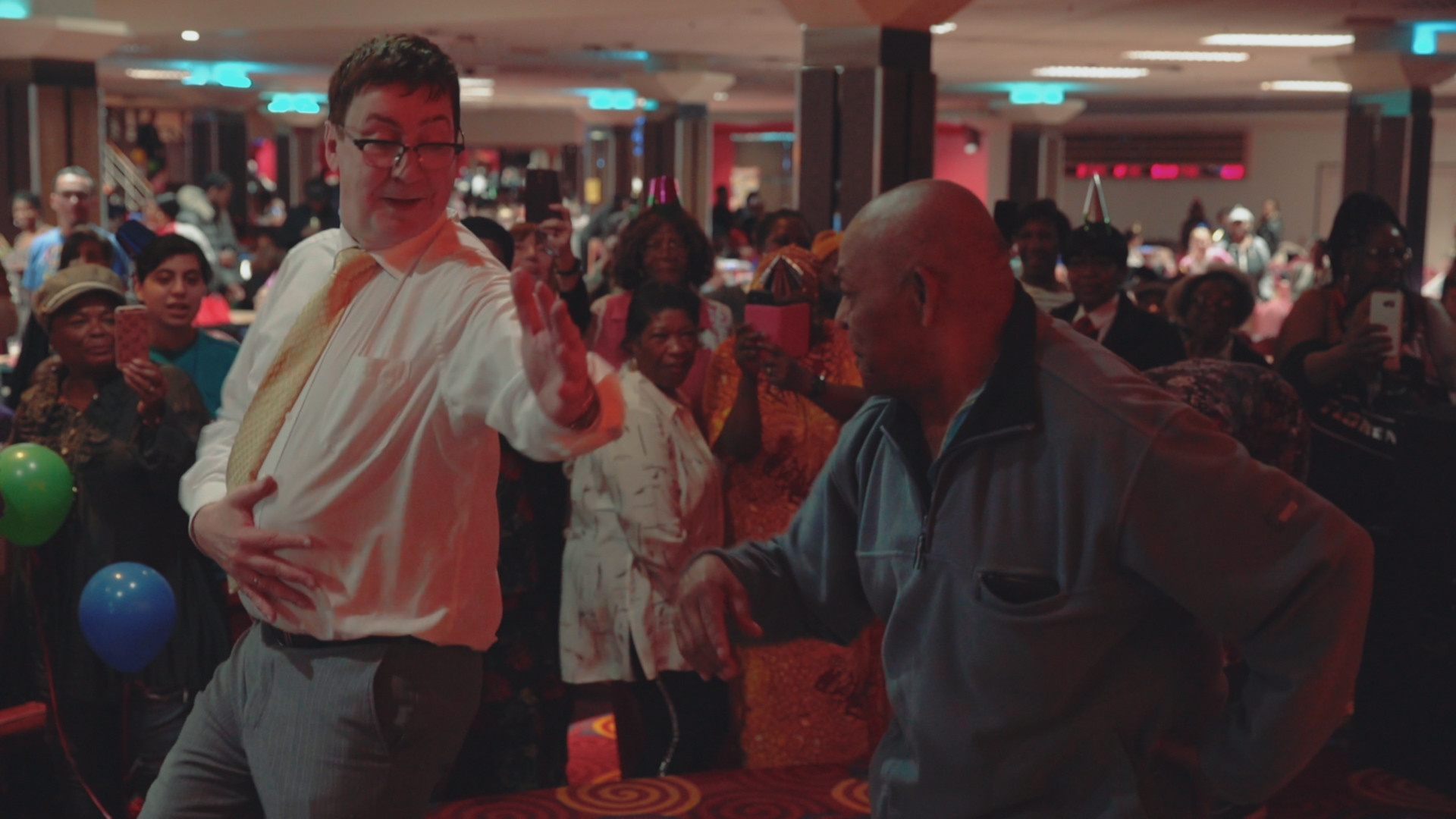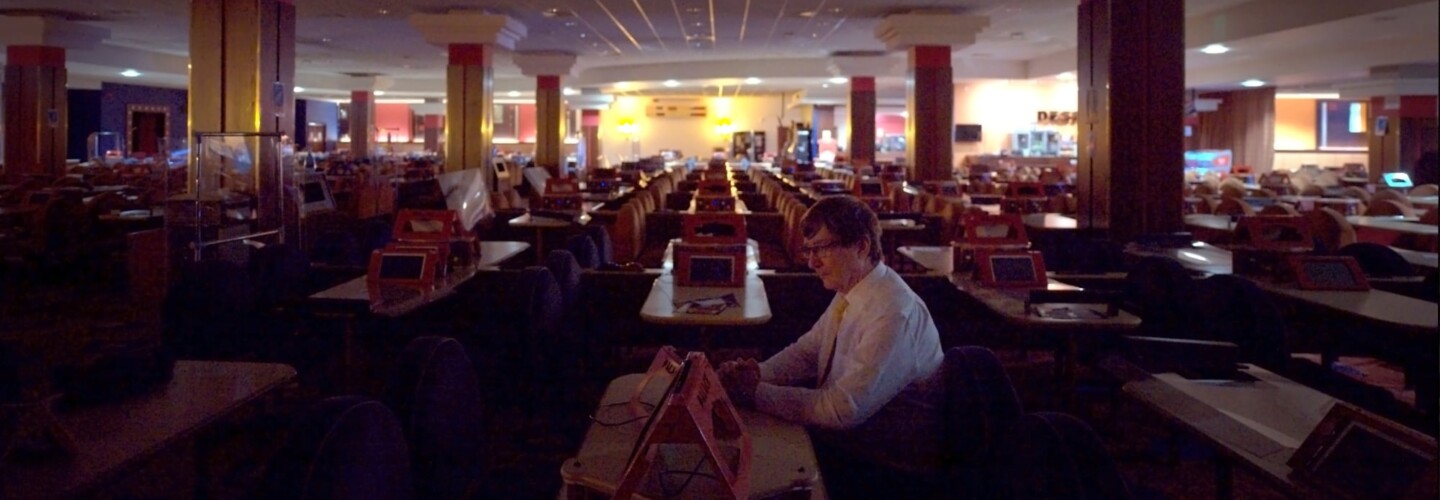
City redevelopments can make the view more pleasing to the eye but often have a negative impact on the people who are forced to leave the new sparkling neighbourhoods. For twenty years London Palace Bingo Club was a second home to many people who suffer from loneliness and deprivation. The club offered them new friends, hot meals and for some, it even helped them deal with the loss of those close to them. In her beautifully told BAFTA nominated documentary short The Palace, Jo Prichard tenderly observes the bingo club and its locals right before the shutting down of the club for good because of the South London’s redevelopment plans. We invited Prichard to join us on DN to discuss the importance of commemorating this iconic South London institution, documenting the human consequences of gentrification and the knowledge to be gained from passion projects.

You’ve mainly worked as a producer what made you take up directing?
I’ve always wanted to be a director. Since starting in the UK documentary industry I’d been working my way up through the editorial roles and had arrived at producing where I was hoping to be able to get a break as a director at some point, but I wasn’t really sure how it was going to happen. There is a gendered issue of perception in the industry that most of us women who want to direct see ourselves come up against at a certain point; directing roles are offered more to men while women are seen more as producers. When I joined the industry people would always say if you want to be a director you should try and do it yourself, then you can show people what you can do and they’ll be more likely to take a punt on you. The reality is much easier said than done but I’m so happy I persevered, and that I was able to do it independently so the mistakes but also the creative choices were all mine to work out.
How did you find The London Palace Bingo Club?
I’ve lived in South London for 15 years now, the Elephant Castle shopping centre that had the London Palace Bingo Club inside it was a well-loved and iconic spot for South Londoners! Whether they were just passing through it daily on their commutes into central London or spending the evening there. The history of the area meant that it had one of the most diverse populations of any part of the city, and within the shopping centre the restaurants, shops, stalls, bingo and bowling clubs all meant a huge amount to many different people and groups. The shopping centre had been threatened by closure for 15 years and it was looking finally like the plans to demolish it were looming. I knew I wanted to do a project documenting the place and what it meant to the locals so I spent a couple of years trying to develop the right angle on the story before settling on The London Palace Bingo Club as the focus. I got access with the owner Patrick and started filming there in 2019.

The people in the film come from various backgrounds and ethnicities who have spent years playing bingo, what does this club represent to them?
For lots of the regulars at The Palace, it was the place where their whole social lives played out. They went there to meet their friends or to make new ones, to pass their days sitting somewhere warm or to relax, party and enjoy themselves. I also realised after spending more time there that because of the lack of provisions for pensioners in this country the Bingo hall was a crucial daily support to the ageing population of the area. Entry was 50p, the hot meals were £1, tea and coffee were free and it was open from 10 in the morning to 12 at night. In the film one interviewee Tom describes it as their ‘playground’. Grown-ups need a playground too, and don’t those who’ve spent their entire working lives paying into society working in vital jobs and services deserve one?
It’s the council’s role to safeguard the lives of their constituents and in this instance, I hope the film makes it clear that they failed.
On the last evening, the club owner Patrick talks about redevelopment, but he mentions he doesn’t want to make it a political speech. The film has this undertone of the impact redevelopment has on less fortunate people. Is that something you wanted to stress with your film?
The negatives of regeneration are well documented so with The Palace I wanted to try and show something of the human and emotional impact of this choice that had been made by developers and the council. Redevelopment is quite a hard subject for documentary because the process is slow and incremental but the club in the film came to an abrupt close which allowed for a definitive end to the story. Patrick the club’s owner is essentially a businessman and, although he’s a very caring one, he didn’t feel he had the right to make ‘political’ statements or campaign against the negative impacts of the redevelopment on his customers. But it’s not actually his responsibility. It’s the council’s role to safeguard the lives of their constituents and in this instance, I hope the film makes it clear that they failed. The honest way the interviewees open up about what the club means to them and their quiet resignation to losing it I found heartbreaking. It’s all very British, stoically facing up to unfairness and trying to make a joke about it because you expected nothing less, I wanted to use that to make the point.

The Bingo club was closed in 2020, do you keep up with the owner or the people who went to Palace? Maybe the club found a new home?
The London Palace Bingo Club hasn’t found a new home in London and realistically is very unlikely to. The value of property and land is going up exponentially all over the city, so I’m sure there will be stories similar to this one playing out all across the capital. I have kept in touch with Patrick, he has another Bingo club in Great Yarmouth so he’ll be OK, although his business has been heavily impacted by the pandemic. As for the regulars who I have also been speaking to, some now go to other Bingo clubs that are long bus rides from their homes and some have struggled to support and feed themselves during the pandemic, and many have found it a very lonely time. But they’re all good for a chat, and mostly contactable via landline.
As you describe, The Palace is your non-funded passion project. What were the challenges of producing and shooting the film without financial support?
I couldn’t have made this film without the support of the people who joined me to finish it, especially the editor, executive producer, the composer and the sound team. The reality of making something this way means a lot of working evenings, weekends and finding bits of time between contracts. There are barriers at various stages and money was a worry throughout, but luckily, I managed to find people who believed in the project and were willing to donate lots of their skills and time to get it made.
The honest way the interviewees open up about what the club means to them and their quiet resignation to losing it I found heartbreaking.
I had applied quite a few times for funding, support and backing from personal contacts, channels and schemes in the documentary industry but had no success, which meant that the main overall challenge I faced was preserving my confidence in the project enough to keep pushing on to finish it. I finished the film having spent a few hundred pounds of my own money. The benefit of doing something this way is that when it’s done you’ve learned so much more than you ever imagined you would, and had a hand in every single part of the process. I also couldn’t have made an un-funded observational film like this if it wasn’t local to me. I went filming there after work or whenever I could and I managed to capture all the key moments, if it had been in another city or country it just wouldn’t have worked.
The film mostly takes place inside the club but we also see glimpses of the redeveloped South London as the camera passes the new buildings. That, in my opinion, creates this sadly melancholic notion of inevitable change.
It took a while to work out how to structure the film once I knew it was going to be based around one venue or precinct. I decided that using the passing of time from night to day would be the right way to push the story forward. With that I wanted to use those breaks where you would visually leave the building and feel time passing to be reflective and quite abstract. I don’t love the use of music over interview in documentary to heighten a mood, I find the content of what someone is saying is enough to deliver the emotion and music can get in the way. Only having the music over the external establishing shots of the redevelopment around the area meant that those pauses had more atmosphere than just being breathers from the testimony.

How closely did you work with Composer Dimitrios Ntontis when deciding on the structure and feel of the soundtrack?
Dimitrios is a musician and instrumentalist who had worked on a friend’s film, who introduced me. I knew I wanted original recorded piano music rather than electric compositions for this and I had a couple of references that I sent him. The interludes with the external shots that were breaks in the action were already established in the fine-cut, so Dimitrios composed parts that were the right kind of moods for each slot and we chose from those together. I think he did a beautiful job of making music that was driving and nostalgic rather than on-the-nose sad.
The Palace has been nominated for this year’s BAFTAs, what does that nomination mean to you?
When I found out it was nominated for a BAFTA it was the biggest ever shock and a huge honour. I’m really glad firstly that it means the film will be seen more widely. People have also been telling me that it will mean that funding my next project will be easier, and if that’s true then I couldn’t ask for more. It’s a lovely thing to be able to talk to people who are also new and aspiring documentary directors like I am; it’s an amazing incentive not to lose faith in your personal projects.
Speaking of which, do you have any new projects on the horizon?
I’m working up a few ideas of things that I care about and am having some conversations with production companies. I’d like to do another film based in London, and it’s never difficult finding stories here. I think I’m addicted to the challenge of filming actuality/verité so I’d like to film the bulk of my next project myself too. The ease of being able to film in the city where you live allows you to be more reactive to real stuff happening rather than always instigating stuff to happen to fit your shoot schedule. I will also realistically be working in documentaries for TV and streamers probably always because I enjoy the work and the bills need to be paid! But this has shown me side projects are an incredible outlet and worth spending the time and energy on if you can spare it.


